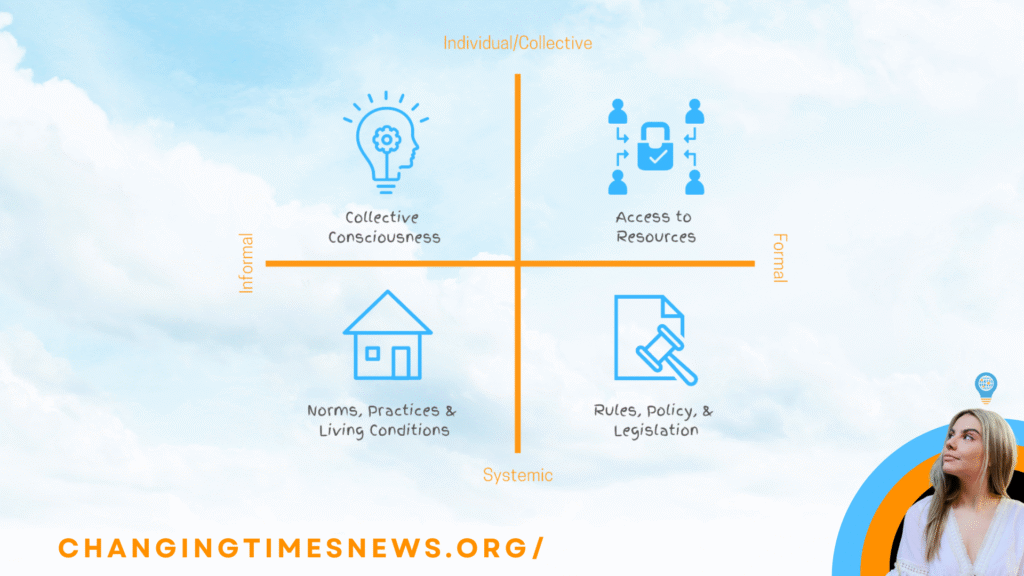In this week’s episode of Changemaker Q&A, we explored how systems thinking can shift the way we see complex social issues—from youth crime to housing, bushfires, and mental health. Rather than treating symptoms, systems thinking encourages us to ask deeper questions: what are the underlying structures and feedback loops that keep problems in place?
The episode coincides with the Humanitarian Changemakers Network’s new initiative: a free introduction to systems thinking workshop, alongside the launch of its first full systems thinking course. The six-week course is designed to guide changemakers through the foundations of systems thinking, system dynamics, and strategies for systems change.
As course facilitator Tiyana J explained, “systems thinking should give us a much more comprehensive picture of the root causes of these problems—and influence the types of interventions we design.”
Youth Crime: Beyond “Tough on Crime”
One example explored in the episode is the persistence of “tough on crime” narratives in Queensland politics. Calls for more police, stricter curfews, and harsher sentences might offer the appearance of decisive action, but they often reinforce cycles of disadvantage.
According to the Australian Institute of Criminology, punitive responses rarely reduce re-offending rates and can even deepen the marginalisation of young people (AIC). Systems thinking reframes the issue by focusing on prevention, early intervention, and restorative justice. Instead of just policing the symptoms, it highlights the structural drivers—poverty, intergenerational trauma, systemic racism, and limited opportunities—that shape outcomes for young people.
Housing: A System Designed for Inequality
Australia’s housing affordability crisis has become one of the most pressing issues for younger generations. While government responses often focus on first-home buyer grants or rental freezes, these measures rarely address the underlying system.
As researchers at the Australian Housing and Urban Research Institute have pointed out, tax policies like negative gearing and capital gains discounts structurally encourage speculative investment over home ownership (AHURI). Combined with chronic underinvestment in social housing and restrictive planning regulations, these policies lock people out of secure housing and keep prices rising.
Systems thinking reveals how multiple reinforcing loops—from banks profiting on rising mortgages to political hesitation around reform—perpetuate the crisis. Solutions, therefore, must target structural change: reforming tax policy, expanding public housing, and shifting cultural narratives to see housing as a human right rather than just an investment vehicle.
Bushfires: From Response to Resilience
Another case study in the episode looked at Australia’s worsening bushfire seasons. While emergency responses—funding firefighting services, disaster relief, and hazard reduction burns—remain essential, they are largely reactive.
The Climate Council has warned that climate change is a major driver of “mega fires,” making fire seasons longer and more intense (Climate Council). At the same time, the suppression of Indigenous cultural burning practices has left landscapes more fire-prone. Urban sprawl into high-risk zones compounds the risk.
A systems approach reframes the challenge around resilience. This means integrating Indigenous fire stewardship, accelerating climate action, reforming land-use planning, and ensuring governance structures break down silos across emergency services, planning, climate, and cultural sectors.
Mental Health: Beyond the Clinic
Finally, the episode unpacked Australia’s strained mental health system. While governments have invested heavily in crisis services and helplines, the system remains overburdened. Suicide remains one of the leading causes of death for young Australians.
Systems thinking reveals why: mental health is shaped not only by access to clinical care but also by housing, education, employment, and social inclusion. As the World Health Organization notes, social determinants like poverty, inequality, and discrimination are central to mental health outcomes (WHO).
The feedback loops are clear: housing stress increases distress, which undermines employment, which compounds hardship. Breaking these cycles requires upstream investment in prevention, cross-sector collaboration, cultural safety, and Indigenous leadership in designing responses.
Why Systems Thinking Matters
Across these case studies, the insight is clear: systems produce the outcomes they are designed to produce. If changemakers want different results—whether on youth justice, housing, bushfires, or mental health—they must shift their focus from symptoms to structures.
The Humanitarian Changemakers Network is working to build this capacity through its workshops and courses. For activists, policymakers, and community leaders, systems thinking offers both a lens and a toolkit for creating change that lasts.


